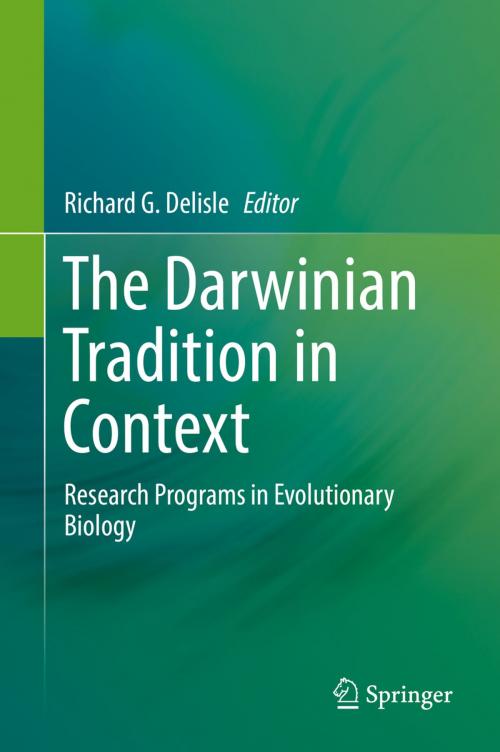The Darwinian Tradition in Context
Research Programs in Evolutionary Biology
Nonfiction, Science & Nature, Science, Biological Sciences, Evolution, Other Sciences, History| Author: | ISBN: | 9783319691237 | |
| Publisher: | Springer International Publishing | Publication: | December 29, 2017 |
| Imprint: | Springer | Language: | English |
| Author: | |
| ISBN: | 9783319691237 |
| Publisher: | Springer International Publishing |
| Publication: | December 29, 2017 |
| Imprint: | Springer |
| Language: | English |
The main goal of this book is to put the Darwinian tradition in context by raising questions such as: How should it be defined? Did it interact with other research programs? Were there any research programs that developed largely independently of the Darwinian tradition? Accordingly, the contributing authors explicitly explore the nature of the relationship between the Darwinian tradition and other research programs running in parallel.
In the wake of the Synthetic Theory of Evolution, which was established throughout the 1930s, 1940s, and 1950s, historians and philosophers of biology devoted considerable attention to the Darwinian tradition, i.e., linking Charles Darwin to mid-Twentieth-Century developments in evolutionary biology. Since then, more recent developments in evolutionary biology have challenged, in part or entirely, the heritage of the Darwinian tradition. Not surprisingly, this has in turn been followed by a historiographical “recalibration” on the part of historians and philosophers regarding other research programs and traditions in evolutionary biology. In order to acknowledge this shift, the papers in this book have been arranged on the basis of two main threads:
Part I: A perspective that views Darwinism as either being originally pluralistic or having acquired such a pluralistic nature through modifications and borrowings over time.
Part II: A perspective blurring the boundaries between non-Darwinian and Darwinian traditions, either by contending that Darwinism itself was never quite as Darwinian as previously assumed, or that non-Darwinian traditions took on board various Darwinian components, when not fertilizing Darwinism directly.
Between a Darwinism reaching out to other research programs and non-Darwinian programs reaching out to Darwinism, the least that can be said is that this interweaving of intellectual threads blurs the historiographical field. This volume aims to open vital new avenues for approaching and reflecting on the development of evolutionary biology.
The main goal of this book is to put the Darwinian tradition in context by raising questions such as: How should it be defined? Did it interact with other research programs? Were there any research programs that developed largely independently of the Darwinian tradition? Accordingly, the contributing authors explicitly explore the nature of the relationship between the Darwinian tradition and other research programs running in parallel.
In the wake of the Synthetic Theory of Evolution, which was established throughout the 1930s, 1940s, and 1950s, historians and philosophers of biology devoted considerable attention to the Darwinian tradition, i.e., linking Charles Darwin to mid-Twentieth-Century developments in evolutionary biology. Since then, more recent developments in evolutionary biology have challenged, in part or entirely, the heritage of the Darwinian tradition. Not surprisingly, this has in turn been followed by a historiographical “recalibration” on the part of historians and philosophers regarding other research programs and traditions in evolutionary biology. In order to acknowledge this shift, the papers in this book have been arranged on the basis of two main threads:
Part I: A perspective that views Darwinism as either being originally pluralistic or having acquired such a pluralistic nature through modifications and borrowings over time.
Part II: A perspective blurring the boundaries between non-Darwinian and Darwinian traditions, either by contending that Darwinism itself was never quite as Darwinian as previously assumed, or that non-Darwinian traditions took on board various Darwinian components, when not fertilizing Darwinism directly.
Between a Darwinism reaching out to other research programs and non-Darwinian programs reaching out to Darwinism, the least that can be said is that this interweaving of intellectual threads blurs the historiographical field. This volume aims to open vital new avenues for approaching and reflecting on the development of evolutionary biology.















